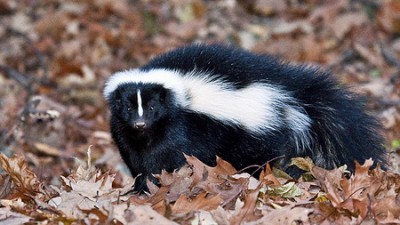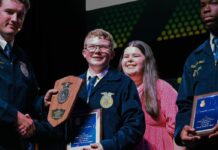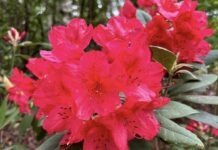
If you’ve driven along any of Habersham County’s major thoroughfares lately chances are good you’ve been met by the unwelcome sight, and smell, of dead skunks. Skunk roadkill appears to be on the rise and many are asking, ‘What’s with the skunks?’ Local wildlife experts say it’s not a skunk apocalypse, it’s breeding season.
Kevin Peyton is the Natural Resources Instructor at North Georgia Technical College in Clarkesville. He says February marks the beginning of the adult skunk breeding season and they’re on the prowl. “They’re seeking out and competing for mates.” Peyton says. “They may have to travel father to find mates. It increases the likelihood they will cross the road and encounter a car.”
Add to that the fact that these normally nocturnal, hormonally-charged polecats are now more active during high traffic times and you have the recipe for, well, a not so good skunk date.
It’s not only drivers who are seeing and smelling skunks in the ‘Sham…homeowners, too, are noticing them more.
Habersham County Extension Coordinator Stephen Patrick says he’s received numerous calls from people asking about cone-shaped depressions in their yards. Patrick says the holes are caused by skunks digging for grubs (insect larva, especially from beetles). “We’ve had dry falls and hard, cold freeze winters and that translates into lower and lower insect survival numbers,” he says. Fewer insects means fewer grubs and that means that skunks and other wildlife have to go farther, look harder and dig deeper for food. Patrick says, “When we get these single digit temperatures it drives the grubs even deeper into the ground.”
Even with a limited grub supply, Peyton assures skunks aren’t starving. Their diets are varied enough to help them survive. Still, their digging and deaths are a nuisance.
You can get rid of the skunks in your yard by getting rid of the grubs. “If you take away their food source they have no reason to dig,” explains Peyton. He suggests spraying your yard with insecticide. You can spray anytime but Patrick says it works best if you spray in the fall. Be careful to apply the insecticide only as directed and, if you’re on well water, don’t spray near your water supply. Also, be sure to keep pet food and trash securely stored because skunks go after that, too.
Back on the road, when you see a skunk crossing try not to hit it. Remember, it’s on its way to find dinner and a date. If, however, you do pass by one of the many unfortunate casanovas Patrick advises, “Don’t try to straddle ’em. Try to go around ’em or you’ll be smelling the stink for a few miles.”







